1948 United States Senate elections
The 1948 United States Senate elections were elections which coincided with the election of Democratic President Harry S. Truman for a full term. Truman had campaigned against an "obstructionist" Congress that had blocked many of his initiatives, and in addition the U.S. economy recovered from the postwar recession of 1946–47 by election day. Thus Truman was rewarded with a Democratic gain of nine seats in the Senate, enough to give them control of the chamber.[1][2]
| ||||||||||||||||||||||||||||||||||||||||
33 of the 96 seats in the United States Senate 49 seats needed for a majority | ||||||||||||||||||||||||||||||||||||||||
|---|---|---|---|---|---|---|---|---|---|---|---|---|---|---|---|---|---|---|---|---|---|---|---|---|---|---|---|---|---|---|---|---|---|---|---|---|---|---|---|---|
| ||||||||||||||||||||||||||||||||||||||||
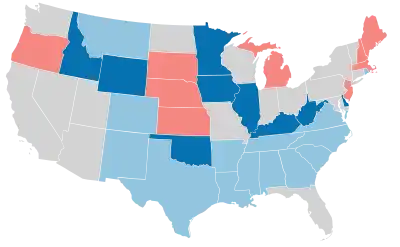 Results of the elections: Democratic gain Democratic hold Republican hold No election | ||||||||||||||||||||||||||||||||||||||||
| ||||||||||||||||||||||||||||||||||||||||
Results summary
| 54 | 42 |
| Democratic | Republican |
Colored shading indicates party with largest share of that row.
| Parties | Total | ||||||||||||||||||||||||||||||||||||||||||||||||||||||||||||||||||||||||||||||||||||||||||||||||||
|---|---|---|---|---|---|---|---|---|---|---|---|---|---|---|---|---|---|---|---|---|---|---|---|---|---|---|---|---|---|---|---|---|---|---|---|---|---|---|---|---|---|---|---|---|---|---|---|---|---|---|---|---|---|---|---|---|---|---|---|---|---|---|---|---|---|---|---|---|---|---|---|---|---|---|---|---|---|---|---|---|---|---|---|---|---|---|---|---|---|---|---|---|---|---|---|---|---|---|---|
| Democratic | Republican | Other | |||||||||||||||||||||||||||||||||||||||||||||||||||||||||||||||||||||||||||||||||||||||||||||||||
| Last elections (1946) Before these elections |
45 | 51 | 0 | 96 | |||||||||||||||||||||||||||||||||||||||||||||||||||||||||||||||||||||||||||||||||||||||||||||||
| Not up | 30 | 33 | 0 | 63 | |||||||||||||||||||||||||||||||||||||||||||||||||||||||||||||||||||||||||||||||||||||||||||||||
| Up | 15 | 18 | 0 | 33 | |||||||||||||||||||||||||||||||||||||||||||||||||||||||||||||||||||||||||||||||||||||||||||||||
| Class 2 (1942→1948) | 14 | 18 | 0 | 32 | |||||||||||||||||||||||||||||||||||||||||||||||||||||||||||||||||||||||||||||||||||||||||||||||
| Special: Class 3 | 1 | 0 | — | 1 | |||||||||||||||||||||||||||||||||||||||||||||||||||||||||||||||||||||||||||||||||||||||||||||||
| Incumbent retired | 3 | 5 | — | 8 | |||||||||||||||||||||||||||||||||||||||||||||||||||||||||||||||||||||||||||||||||||||||||||||||
| Held by same party | 3 | 4 | — | 7 | |||||||||||||||||||||||||||||||||||||||||||||||||||||||||||||||||||||||||||||||||||||||||||||||
| Replaced by other party | — | 1 | |||||||||||||||||||||||||||||||||||||||||||||||||||||||||||||||||||||||||||||||||||||||||||||||||
| Result | 4 | 4 | 0 | 8 | |||||||||||||||||||||||||||||||||||||||||||||||||||||||||||||||||||||||||||||||||||||||||||||||
| Incumbent ran | 12 | 13 | — | 25 | |||||||||||||||||||||||||||||||||||||||||||||||||||||||||||||||||||||||||||||||||||||||||||||||
| Won re-election | 10 | 5 | — | 17 | |||||||||||||||||||||||||||||||||||||||||||||||||||||||||||||||||||||||||||||||||||||||||||||||
| Lost re-election | — | 8 | |||||||||||||||||||||||||||||||||||||||||||||||||||||||||||||||||||||||||||||||||||||||||||||||||
| Lost renomination but held by same party |
2 | 0 | — | 2 | |||||||||||||||||||||||||||||||||||||||||||||||||||||||||||||||||||||||||||||||||||||||||||||||
| Result | 20 | 5 | 0 | 25 | |||||||||||||||||||||||||||||||||||||||||||||||||||||||||||||||||||||||||||||||||||||||||||||||
| Total elected | 24 | 9 | 0 | 33 | |||||||||||||||||||||||||||||||||||||||||||||||||||||||||||||||||||||||||||||||||||||||||||||||
| Net change | 9 | ||||||||||||||||||||||||||||||||||||||||||||||||||||||||||||||||||||||||||||||||||||||||||||||||||
| Nationwide vote | 13,056,944 | 9,764,384 | 269,669 | 23,090,997 | |||||||||||||||||||||||||||||||||||||||||||||||||||||||||||||||||||||||||||||||||||||||||||||||
| Share | 56.55% | 42.29% | 1.17% | 100% | |||||||||||||||||||||||||||||||||||||||||||||||||||||||||||||||||||||||||||||||||||||||||||||||
| Result | 54 | 42 | 0 | 96 | |||||||||||||||||||||||||||||||||||||||||||||||||||||||||||||||||||||||||||||||||||||||||||||||
Source: Clerk of the U.S. House of Representatives[3]
Gains and losses
In addition to gaining an open seat in Oklahoma, the Democrats defeated eight Republican incumbents:
- C. Douglass Buck (R-DE)
- Henry Dworshak (R-ID)
- Charles W. Brooks (R-IL)
- George A. Wilson (R-IA)
- John Sherman Cooper (R-KY)
- Joseph H. Ball (R-MN)
- Chapman Revercomb (R-WV)
- Edward V. Robertson (R-WY)
Change in composition
Before the elections
| D1 | D2 | D3 | D4 | D5 | D6 | D7 | D8 | ||
| D18 | D17 | D16 | D15 | D14 | D13 | D12 | D11 | D10 | D9 |
| D19 | D20 | D21 | D22 | D23 | D24 | D25 | D26 | D27 | D28 |
| D38 Mont. Ran |
D37 Miss. Ran |
D36 La. (sp) Retired |
D35 La. (reg) Ran |
D34 Ga. Ran |
D33 Colo. Ran |
D32 Ark. Ran |
D31 Ala. Ran |
D30 | D29 |
| D39 N.M. Retired |
D40 N.C. (sp) N.C. (reg) Ran |
D41 R.I. Ran |
D42 S.C. Ran |
D43 Tenn. Ran |
D44 Texas Retired |
D45 Va. Ran |
R51 Wyo. Ran |
R50 W.Va. Ran |
R49 S.D. Retired |
| Majority → | |||||||||
| R39 Ky. Ran |
R40 Maine Retired |
R41 Mass. Ran |
R42 Mich. Ran |
R43 Minn. Ran |
R44 Neb. Ran |
R45 N.H. Ran |
R46 N.J. Retired |
R47 Okla. Retired |
R48 Ore. Ran |
| R38 Kan. Retired |
R37 Iowa Ran |
R36 Ill. Ran |
R35 Idaho Ran |
R34 Del. Ran |
R33 | R32 | R31 | R30 | R29 |
| R19 | R20 | R21 | R22 | R23 | R24 | R25 | R26 | R27 | R28 |
| R18 | R17 | R16 | R15 | R14 | R13 | R12 | R11 | R10 | R9 |
| R1 | R2 | R3 | R4 | R5 | R6 | R7 | R8 | ||
Election results
| D1 | D2 | D3 | D4 | D5 | D6 | D7 | D8 | ||
| D18 | D17 | D16 | D15 | D14 | D13 | D12 | D11 | D10 | D9 |
| D19 | D20 | D21 | D22 | D23 | D24 | D25 | D26 | D27 | D28 |
| D38 Mont. Re-elected |
D37 Miss. Re-elected |
D36 La. (sp) Hold |
D35 La. (reg) Re-elected |
D34 Ga. Re-elected |
D33 Colo. Re-elected |
D32 Ark. Re-elected |
D31 Ala. Re-elected |
D30 | D29 |
| D39 N.M. Hold |
D40 N.C. (sp) N.C. (reg) Hold |
D41 R.I. Re-elected |
D42 S.C. Re-elected |
D43 Tenn. Hold |
D44 Texas Hold |
D45 Va. Re-elected |
D46 Del. Gain |
D47 Idaho Gain |
D48 Ill. Gain |
| Majority → | D49 Iowa Gain | ||||||||
| R39 N.H. Re-elected |
R40 N.J. Hold |
R41 Ore. Re-elected |
R42 S.D. Hold |
D54 Wyo. Gain |
D53 W.Va. Gain |
D52 Okla. Gain |
D51 Minn. Gain |
D50 Ky. Gain | |
| R38 Neb. Re-elected |
R37 Mich. Re-elected |
R36 Mass. Re-elected |
R35 Maine Hold |
R34 Kan. Hold |
R33 | R32 | R31 | R30 | R29 |
| R19 | R20 | R21 | R22 | R23 | R24 | R25 | R26 | R27 | R28 |
| R18 | R17 | R16 | R15 | R14 | R13 | R12 | R11 | R10 | R9 |
| R1 | R2 | R3 | R4 | R5 | R6 | R7 | R8 | ||
| Key: |
|
|---|
Race summaries
Special elections during the 80th Congress
In these special elections, the winner was seated during 1948 or before January 3, 1949; ordered by election date.
| State | Incumbent | Results | Candidates | ||
|---|---|---|---|---|---|
| Senator | Party | Electoral history | |||
| Louisiana (Class 3) |
William C. Feazel | Democratic | 1948 (Appointed) | Interim appointee retired. Winner elected November 2, 1948. Democratic hold. |
|
| North Carolina (Class 2) |
William B. Umstead | Democratic | 1946 (Appointed) | Interim appointee lost re-nomination. Winner elected November 2, 1948. Democratic hold. Winner also elected to the next full term. |
|
Elections leading to the next Congress
In these general elections, the winners were elected for the term beginning January 3, 1949; ordered by state.
All of the elections involved the Class 2 seats.
| State | Incumbent | Results | Candidates | ||
|---|---|---|---|---|---|
| Senator | Party | Electoral history | |||
| Alabama | John Sparkman | Democratic | 1946 (Special) | Incumbent re-elected. |
|
| Arkansas | John L. McClellan | Democratic | 1942 | Incumbent re-elected. |
|
| Colorado | Edwin C. Johnson | Democratic | 1936 1942 |
Incumbent re-elected. |
|
| Delaware | C. Douglass Buck | Republican | 1942 | Incumbent lost re-election. New senator elected. Democratic gain. |
|
| Georgia | Richard Russell Jr. | Democratic | 1932 (Special) 1936 1942 |
Incumbent re-elected. |
|
| Idaho | Henry Dworshak | Republican | 1946 (Special) | Incumbent lost re-election. New senator elected. Democratic gain. |
|
| Illinois | Charles W. Brooks | Republican | 1940 (Special) 1942 |
Incumbent lost re-election. New senator elected. Democratic gain. |
|
| Iowa | George A. Wilson | Republican | 1942 | Incumbent lost re-election. New senator elected. Democratic gain. |
|
| Kansas | Arthur Capper | Republican | 1918 1924 1930 1936 1942 |
Incumbent retired. New senator elected. Republican hold. |
|
| Kentucky | John Sherman Cooper | Republican | 1946 (Special) | Incumbent lost re-election. New senator elected. Democratic gain. |
|
| Louisiana | Allen J. Ellender | Democratic | 1936 1942 |
Incumbent re-elected. |
|
| Maine | Wallace H. White Jr. | Republican | 1930 1936 1942 |
Incumbent retired. New senator elected. Republican hold. |
|
| Massachusetts | Leverett Saltonstall | Republican | 1944 (Special) | Incumbent re-elected. |
|
| Michigan | Homer S. Ferguson | Republican | 1942 | Incumbent re-elected. |
|
| Minnesota | Joseph H. Ball | Republican | 1940 (Appointed) 1942 (Retired) 1942 |
Incumbent lost re-election. New senator elected. Democratic gain. |
|
| Mississippi | James Eastland | Democratic | 1941 (Appointed) 1941 (Retired) 1942 |
Incumbent re-elected. |
|
| Montana | James E. Murray | Democratic | 1934 (Special) 1936 1942 |
Incumbent re-elected. |
|
| Nebraska | Kenneth S. Wherry | Republican | 1942 | Incumbent re-elected. |
|
| New Hampshire | Styles Bridges | Republican | 1936 1942 |
Incumbent re-elected. |
|
| New Jersey | Albert W. Hawkes | Republican | 1942 | Incumbent retired. New senator elected. Republican hold. |
|
| New Mexico | Carl Hatch | Democratic | 1933 (Appointed) 1934 (Special) 1936 1942 |
Incumbent retired. New senator elected. Democratic hold. |
|
| North Carolina | William B. Umstead | Democratic | 1946 (Appointed) | Interim appointee lost re-nomination. New senator elected. Democratic hold. Winner also elected to finish the term, see above. |
|
| Oklahoma | Edward H. Moore | Republican | 1942 | Incumbent retired. New senator elected. Democratic gain. |
|
| Oregon | Guy Cordon | Republican | 1944 (Appointed) 1944 (Special) |
Incumbent re-elected. |
|
| Rhode Island | Theodore F. Green | Democratic | 1936 1942 |
Incumbent re-elected. |
|
| South Carolina | Burnet R. Maybank | Democratic | 1941 (Special) 1942 |
Incumbent re-elected. |
|
| South Dakota | Vera C. Bushfield | Republican | 1948 (Appointed) | Interim appointee retired. New senator elected. Republican hold. Incumbent resigned December 26, 1948 and winner appointed December 31, 1948 to finish the term. |
|
| Tennessee | Tom Stewart | Democratic | 1938 (Special) | Incumbent lost re-nomination. New senator elected. Democratic hold. |
|
| Texas | W. Lee O'Daniel | Democratic | 1941 (Special) 1942 |
Incumbent retired. New senator elected. Democratic hold. |
|
| Virginia | Absalom Willis Robertson | Democratic | 1946 (Special) | Incumbent re-elected. |
|
| West Virginia | Chapman Revercomb | Republican | 1942 | Incumbent lost re-election. New senator elected. Democratic gain. |
|
| Wyoming | Edward V. Robertson | Republican | 1942 | Incumbent lost re-election. New senator elected. Democratic gain. |
|
Alabama
| |||||||||||||||||
| |||||||||||||||||
| |||||||||||||||||
| Party | Candidate | Votes | % | |
|---|---|---|---|---|
| Democratic | John Sparkman (Incumbent) | 185,534 | 84.00% | |
| Republican | Paul G. Parsons | 35,341 | 16.00% | |
| Majority | 150,193 | 68.00% | ||
| Turnout | 220,875 | |||
| Democratic hold | ||||
Arkansas
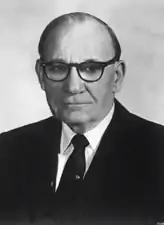
| Party | Candidate | Votes | % | |
|---|---|---|---|---|
| Democratic | John L. McClellan (Incumbent) | 216,401 | 100.00% | |
| Democratic hold | ||||
Colorado
| |||||||||||||||||
| |||||||||||||||||
| Party | Candidate | Votes | % | |
|---|---|---|---|---|
| Democratic | Edwin C. Johnson | 340,719 | 66.79% | |
| Republican | Will Nicholson | 165,069 | 32.36% | |
| Progressive | Joe Gurule | 2,981 | 0.58% | |
| Socialist | Carle Whithead | 1,352 | 0.27% | |
| Majority | 175,650 | 34.43% | ||
| Turnout | 510,121 | |||
| Democratic hold | ||||
Delaware
| Party | Candidate | Votes | % | |
|---|---|---|---|---|
| Democratic | J. Allen Frear Jr. | 71,888 | 50.85% | |
| Republican | C. Douglass Buck (incumbent) | 68,246 | 48.28% | |
| Majority | 3,642 | 2.57% | ||
| Turnout | 141,362 | |||
| Democratic gain from Republican | ||||
Georgia
| Party | Candidate | Votes | % | |
|---|---|---|---|---|
| Democratic | Richard Russell Jr. (Incumbent) | 362,104 | 99.89% | |
| Write-In | Larkin Marshall | 388 | 0.11% | |
| Write-In | Ellis Arnall | 9 | 0.00% | |
| Write-In | Roy Harris | 2 | 0.00% | |
| Write-In | Harry Sommers | 1 | 0.00% | |
| Majority | 361,716 | 99.78% | ||
| Turnout | 362,504 | |||
| Democratic hold | ||||
Idaho
| Party | Candidate | Votes | % | |
|---|---|---|---|---|
| Democratic | Bert H. Miller | 107,000 | 49.96% | |
| Republican | Henry Dworshak (Incumbent) | 103,868 | 48.49% | |
| Progressive | John Derr | 3,154 | 1.47% | |
| Socialist | Paul Wengert | 166 | 0.08% | |
| Majority | 3,132 | 1.47% | ||
| Turnout | 214,188 | |||
| Democratic gain from Republican | ||||
Illinois
| |||||||||||||||||
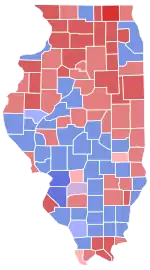 County Results Douglas: 40–50% 50–60% 60–70% Tie: Brooks: 40–50% 50–60% 60–70% 70–80% | |||||||||||||||||
| |||||||||||||||||
| Party | Candidate | Votes | % | |
|---|---|---|---|---|
| Democratic | Paul Douglas | 2,147,754 | 55.07% | |
| Republican | Charles W. Brooks (Incumbent) | 1,740,026 | 44.61% | |
| Prohibition | Enoch A. Holtwick | 9,784 | 0.25% | |
| Socialist Labor | Frank Schnur | 2,693 | 0.07% | |
| None | Write-In | 28 | 0.00% | |
| Majority | 407,728 | 10.46% | ||
| Turnout | 3,900,285 | |||
| Democratic gain from Republican | ||||
Iowa
| Party | Candidate | Votes | % | |
|---|---|---|---|---|
| Democratic | Guy Gillette | 578,226 | 57.80% | |
| Republican | George A. Wilson (Incumbent) | 415,778 | 41.56% | |
| Progressive | Seymour Pitcher | 3,387 | 0.34% | |
| Prohibition | Z. Everett Kellum | 2,580 | 0.26% | |
| Socialist | Hugo Bockewitz | 441 | 0.04% | |
| Majority | 162,448 | 16.24% | ||
| Turnout | 1,000,412 | |||
| Democratic gain from Republican | ||||
Kansas
| Party | Candidate | Votes | % | |
|---|---|---|---|---|
| Republican | Andrew Frank Schoeppel | 393,412 | 54.92% | |
| Democratic | George McGill | 305,987 | 42.72% | |
| Prohibition | C. Floyd Hester | 16,943 | 2.37% | |
| Majority | 87,425 | 12.20% | ||
| Turnout | 716,342 | |||
| Republican hold | ||||
Kentucky
| Party | Candidate | Votes | % | |
|---|---|---|---|---|
| Democratic | Virgil Chapman | 408,256 | 51.39% | |
| Republican | John Sherman Cooper (Incumbent) | 383,776 | 48.31% | |
| Socialist | W. A. Standefur | 1,232 | 0.16% | |
| Progressive | H. G. Stanfield | 924 | 0.12% | |
| Socialist Labor | David R. Cox | 254 | 0.03% | |
| Write-In | John Y. Brown | 26 | 0.00% | |
| Write-In | O. G. Gaines | 1 | 0.00% | |
| Majority | 24,480 | 3.08% | ||
| Turnout | 794,469 | |||
| Democratic gain from Republican | ||||
Louisiana
Louisiana (Regular)
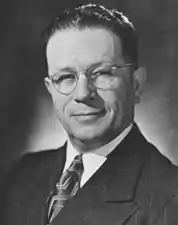
| Party | Candidate | Votes | % | |
|---|---|---|---|---|
| Democratic | Allen J. Ellender (Incumbent) | 330,115 | 100.00% | |
| Independent | Maurice Eugene Clark | 9 | 0.00% | |
| Majority | 330,106 | 100.00% | ||
| Turnout | 330,124 | |||
| Democratic hold | ||||
Louisiana (Special)
| Party | Candidate | Votes | % | |
|---|---|---|---|---|
| Democratic | Russell B. Long | 306,336 | 74.96% | |
| Republican | Clem S. Clarke | 102,331 | 25.04% | |
| Majority | 204,005 | 49.92% | ||
| Turnout | 408,667 | |||
| Democratic hold | ||||
Maine
| |||||||||||||||||
| |||||||||||||||||
| |||||||||||||||||
| Party | Candidate | Votes | % | |
|---|---|---|---|---|
| Republican | Margaret Chase Smith | 159,182 | 71.30% | |
| Democratic | Adrian H. Scolten | 64,074 | 28.70% | |
| Majority | 95,108 | 42.60% | ||
| Turnout | 223,256 | |||
| Republican hold | ||||
Massachusetts
| |||||||||||||||||
| |||||||||||||||||
| Party | Candidate | Votes | % | |
|---|---|---|---|---|
| Republican | Leverett Saltonstall (Incumbent) | 1,088,475 | 52.95% | |
| Democratic | John I. Fitzgerald | 954,398 | 46.42% | |
| Socialist Labor | Henning A. Blomen | 9,266 | 0.45% | |
| Prohibition | E. Tallmadge Root | 3,652 | 0.18% | |
| None | Scattering | 7 | 0.00% | |
| Majority | 134,077 | 6.53% | ||
| Turnout | 2,055,798 | |||
| Republican hold | ||||
Michigan
| Party | Candidate | Votes | % | |
|---|---|---|---|---|
| Republican | Homer S. Ferguson (Incumbent) | 1,045,156 | 50.68% | |
| Democratic | Frank E. Hook | 1,000,329 | 48.51% | |
| Prohibition | Harold A. Lindahl | 12,146 | 0.59% | |
| Socialist | Michael Magee | 2,160 | 0.10% | |
| Socialist Labor | Theos S. Grove | 1,418 | 0.07% | |
| Socialist Workers | Genora Dollinger | 882 | 0.04% | |
| None | Scattering | 2.57% | 0.00% | |
| Majority | 44,827 | 2.17% | ||
| Turnout | 2,062,093 | |||
| Republican hold | ||||
Minnesota
| |||||||||||||||||
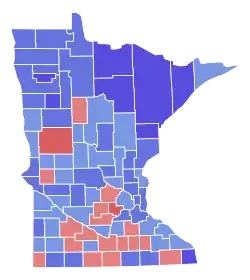 County results Humphrey: 50–60% 60–70% 70–80% Ball: 50-60% 60-70% | |||||||||||||||||
| |||||||||||||||||
| Party | Candidate | Votes | % | |
|---|---|---|---|---|
| Democratic (DFL) | Hubert Humphrey | 729,494 | 59.78% | |
| Republican | Joseph H. Ball (Incumbent) | 485,801 | 39.81% | |
| Socialist Workers | Vincent R. Dunne | 4,951 | 0.41% | |
| None | Scattering | 41.56% | 0.00% | |
| Majority | 243,693 | 19.97% | ||
| Turnout | 1,220,250 | |||
| Democratic (DFL) gain from Republican | ||||
Mississippi
| Party | Candidate | Votes | % | |
|---|---|---|---|---|
| Democratic | James Eastland (Incumbent) | 151,478 | 100.00% | |
| Democratic hold | ||||
Montana
| |||||||||||||||||
| |||||||||||||||||
Incumbent United States Senator James E. Murray, who was first elected to the Senate in a special election in 1934 and was re-elected in 1936 and 1942, ran for re-election. After winning the Democratic primary, he faced Tom J. Davis, an attorney and the Republican nominee, in the general election. Following a narrow re-election in 1936, Murray significantly expanded his margin of victory and comfortably won re-election over Davis, winning his fourth term and his third full term in the Senate.
| Party | Candidate | Votes | % | |
|---|---|---|---|---|
| Democratic | James E. Murray (Incumbent) | 125,193 | 56.65% | |
| Republican | Tom J. Davis | 94,458 | 42.74% | |
| Prohibition | C. S. Hanna | 1,352 | 0.61% | |
| Majority | 30,735 | 13.91% | ||
| Turnout | 221,003 | |||
| Democratic hold | ||||
Nebraska
| Party | Candidate | Votes | % | |
|---|---|---|---|---|
| Republican | Kenneth S. Wherry (Incumbent) | 267,575 | 56.70% | |
| Democratic | Terry Carpenter | 204,320 | 43.30% | |
| Majority | 63,255 | 13.40% | ||
| Turnout | 471,895 | |||
| Republican hold | ||||
New Hampshire
| Party | Candidate | Votes | % | |
|---|---|---|---|---|
| Republican | Styles Bridges (Incumbent) | 129,600 | 58.14% | |
| Democratic | Alfred E. Fortin | 91,760 | 41.17% | |
| Progressive | John G. Rideout | 1,538 | 0.69% | |
| Majority | 37,840 | 16.97% | ||
| Turnout | 222,898 | |||
| Republican hold | ||||
New Jersey
| |||||||||||||||||
 County Results Hendrickson: 40–50% 50-60% 60-70% 70-80% Alexander: 40–50% 50–60% 60–70% | |||||||||||||||||
| |||||||||||||||||
| Party | Candidate | Votes | % | |
|---|---|---|---|---|
| Republican | Robert C. Hendrickson | 934,720 | 49.99% | |
| Democratic | Archibald S. Alexander | 884,414 | 47.30% | |
| Progressive | James Imbrie | 22,658 | 1.21% | |
| Socialist | Rubye Smith | 11,450 | 0.61% | |
| Socialist Workers | George Breitman | 8,076 | 0.43% | |
| Prohibition | George W. Rideout | 4,656 | 0.25% | |
| Socialist Labor | George E. Bopp | 3,908 | 0.21% | |
| Majority | 50,306 | 2.69% | ||
| Turnout | 1,869,882 | |||
| Republican hold | ||||
New Mexico
| Party | Candidate | Votes | % | |
|---|---|---|---|---|
| Democratic | Clinton Presba Anderson (Incumbent) | 108,269 | 57.44% | |
| Republican | Patrick J. Hurley | 80,226 | 42.56% | |
| Majority | 28,043 | 13.88% | ||
| Turnout | 188,495 | |||
| Democratic hold | ||||
North Carolina
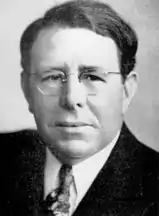
There were 2 elections to the same seat, due to the December 15, 1946 death of three-term Democrat Josiah Bailey. Democratic former congressman William B. Umstead was appointed December 18, 1946 to continue Bailey's term, pending a special election.
Umstead supported the conservative Taft-Hartley Act. The Democratic former Governor of North Carolina J. Melville Broughton was seen as a "rather liberal alternative" to Umstead. Broughton beat Umstead in the Democratic primaries and then won the general elections.
North Carolina (Special)
| Party | Candidate | Votes | % | |
|---|---|---|---|---|
| Democratic | J. Melville Broughton | 206,673 | 52.30% | |
| Democratic | William B. Umstead (Incumbent) | 188,477 | 47.70% | |
| Majority | 18,196 | 4.60% | ||
| Turnout | 11.06% | |||
| Party | Candidate | Votes | % | |
|---|---|---|---|---|
| Democratic | J. Melville Broughton | 534,917 | 100.00% | |
| Turnout | 14.98% | |||
| Democratic hold | ||||
North Carolina (Regular)
| Party | Candidate | Votes | % | |
|---|---|---|---|---|
| Democratic | J. Melville Broughton | 207,907 | 53.05% | |
| Democratic | William B. Umstead (Incumbent) | 184,013 | 46.95% | |
| Majority | 23,894 | 6.10% | ||
| Turnout | 10.97% | |||
| Party | Candidate | Votes | % | |
|---|---|---|---|---|
| Democratic | J. Melville Broughton | 540,762 | 70.73% | |
| Republican | John A. Wilkinson | 220,307 | 28.81% | |
| Progressive | William T. Brown | 3,490 | 0.46% | |
| Majority | 320,455 | 41.91% | ||
| Turnout | 764,559 | 21.41% | ||
| Democratic hold | ||||
Broughton was seated December 31, 1948 to finish the current term but died March 6, 1949, just after the new term began. His death lead to another appointment (Democrat Frank Graham) in 1949 and another special election in 1950 of Democrat Willis Smith. Smith also died during the term, leading to yet another appointment (Democrat Alton A. Lennon) and 1954 special election (of Democrat W. Kerr Scott). In all, five senators held the seat during the 1949–1955 term.
Oklahoma
| Party | Candidate | Votes | % | |
|---|---|---|---|---|
| Democratic | Robert S. Kerr | 441,654 | 62.30% | |
| Republican | Ross Rizley | 265,169 | 37.40% | |
| Independent | W. O. Pratt | 2,108 | 0.30% | |
| Majority | 176,485 | 24.90% | ||
| Turnout | 708,931 | |||
| Democratic gain from Republican | ||||
Oregon
| Party | Candidate | Votes | % | |
|---|---|---|---|---|
| Republican | Guy Cordon | 299,295 | 60.03% | |
| Democratic | Manley J. Wilson | 199,275 | 39.97% | |
| Majority | 100,020 | 20.06% | ||
| Turnout | 498,570 | |||
| Republican hold | ||||
Rhode Island
| Party | Candidate | Votes | % | |
|---|---|---|---|---|
| Democratic | Theodore F. Green (Incumbent) | 190,158 | 59.35% | |
| Republican | Thomas P. Hazard | 130,262 | 40.65% | |
| Majority | 59,896 | 18.70% | ||
| Turnout | 320,420 | |||
| Democratic hold | ||||
South Carolina
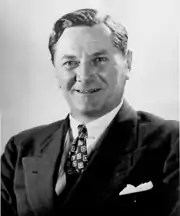
Senator Burnet R. Maybank was opposed in the Democratic primary by U.S. Representative William Jennings Bryan Dorn and three other candidates. Maybank obtained over 50% in the primary election on August 10 to avoid a runoff election.
| Democratic Primary | ||
|---|---|---|
| Candidate | Votes | % |
| Burnet R. Maybank | 161,608 | 51.5 |
| W.J. Bryan Dorn | 76,749 | 24.4 |
| Neville Bennett | 43,068 | 13.7 |
| Alan Johnstone | 17,689 | 5.6 |
| Marcus A. Stone | 14,904 | 4.8 |
Since the end of Reconstruction in 1877, the Democratic Party dominated the politics of South Carolina and its statewide candidates were never seriously challenged. Maybank did not campaign for the general election as there was no chance of defeat.
| Party | Candidate | Votes | % | |
|---|---|---|---|---|
| Democratic | Burnet R. Maybank (Incumbent) | 135,998 | 96.45% | |
| Republican | J. Bates Gerald | 5,008 | 3.55% | |
| Majority | 130,990 | 92.90 | ||
| Turnout | 141,006 | |||
| Democratic hold | ||||
South Dakota
| Party | Candidate | Votes | % | |
|---|---|---|---|---|
| Republican | Karl E. Mundt (Incumbent) | 144,084 | 59.33% | |
| Democratic | John A. Engel | 98,749 | 40.67% | |
| Majority | 45,335 | 18.66% | ||
| Turnout | 242,833 | |||
| Republican hold | ||||
Tennessee
| Party | Candidate | Votes | % | |
|---|---|---|---|---|
| Democratic | Estes Kefauver | 326,142 | 65.33% | |
| Republican | B. Carroll Reece | 166,947 | 33.44% | |
| Independent | John Randolph Neal Jr. | 6,103 | 1.22% | |
| None | Scattering | 26 | 0.01% | |
| Majority | 159,195 | 31.89% | ||
| Turnout | 499,218 | |||
| Democratic hold | ||||
Texas
| |||||||||||||||||
| |||||||||||||||||
| Party | Candidate | Votes | % | |
|---|---|---|---|---|
| Democratic | Lyndon Johnson | 702,985 | 66.22% | |
| Republican | Jack Porter | 349,665 | 32.94% | |
| Prohibition | Samuel N. Morris | 8,913 | 0.84% | |
| Majority | 353,320 | 33.28% | ||
| Turnout | 1,061,563 | |||
| Democratic hold | ||||
Virginia
| |||||||||||||||||
| |||||||||||||||||
| |||||||||||||||||
Incumbent Democrat Absalom Willis Robertson defeated Republican Robert H. Woods and was re-elected to his first full term in office.
| Party | Candidate | Votes | % | ±% | |
|---|---|---|---|---|---|
| Democratic | Absalom Willis Robertson (Incumbent) | 253,865 | 65.74% | -2.41% | |
| Republican | Robert H. Woods | 118,546 | 30.70% | +1.68% | |
| Independent | Howard Carwile | 6,788 | 1.76% | ||
| Progressive | Virginia Foster Durr | 5,347 | 1.38% | +1.38% | |
| Socialist | Clarke T. Robb | 1,627 | 0.42% | -2.40% | |
| Write-ins | 5 | <0.01% | |||
| Majority | 135,319 | 35.04% | -4.09% | ||
| Turnout | 386,168 | ||||
| Democratic hold | Swing | ||||
West Virginia
| Party | Candidate | Votes | % | |
|---|---|---|---|---|
| Democratic | Matthew M. Neely | 435,354 | 56.99% | |
| Republican | Chapman Revercomb (Incumbent) | 328,534 | 43.01% | |
| Majority | 106,810 | 13.98% | ||
| Turnout | 763,888 | |||
| Democratic gain from Republican | ||||
Wyoming
| Party | Candidate | Votes | % | |
|---|---|---|---|---|
| Democratic | Lester C. Hunt | 57,953 | 57.11% | |
| Republican | Edward V. Robertson (Incumbent) | 43,527 | 42.89% | |
| Majority | 14,426 | 14.22% | ||
| Turnout | 101,480 | |||
| Democratic gain from Republican | ||||
See also
References
- William S. White (November 4, 1948). "SWEEP IN CONGRESS – Democrats Obtain 54-42 Margin in Senate by Winning 9 G.O.P. Seats". New York Times. Retrieved April 8, 2014.
- "Truman Sweep". New York Times. November 7, 1948. Retrieved April 8, 2014.
- Clerk of the U.S. House of Representatives (1949-03-01). "Statistics of the Presidential and Congressional Election of November 2, 1948" (PDF). U.S. Government Printing Office. pp. 14–15, 50.
- "Our Campaigns - NC US Senate - Special D Primary Race - May 29, 1948". www.ourcampaigns.com. Retrieved August 26, 2020.
- "Our Campaigns - NC US Senate - Special Election Race - Nov 02, 1948". www.ourcampaigns.com. Retrieved August 26, 2020.
- "Our Campaigns - NC US Senate - D Primary Race - May 29, 1948". www.ourcampaigns.com. Retrieved August 26, 2020.
- "Our Campaigns - NC US Senate Race - Nov 02, 1948". www.ourcampaigns.com. Retrieved August 26, 2020.
Further reading
- Hartley, Robert E. Battleground 1948: Truman, Stevenson, Douglas, and the Most Surprising Election in Illinois History (Southern Illinois University Press; 2013)
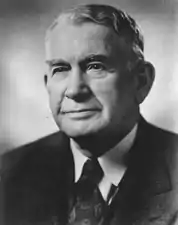

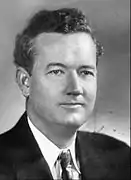
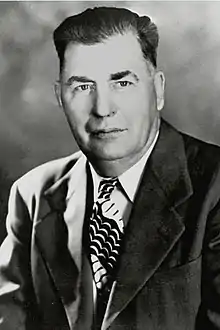

.jpg.webp)
.jpg.webp)
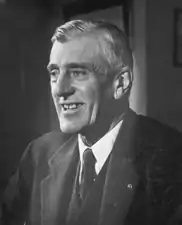
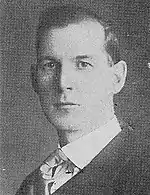
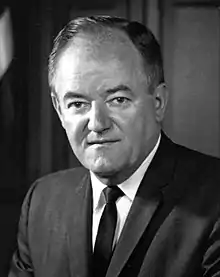
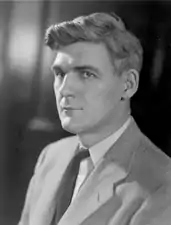
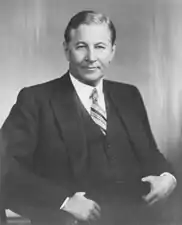
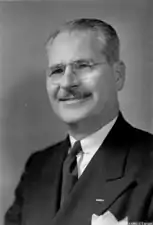
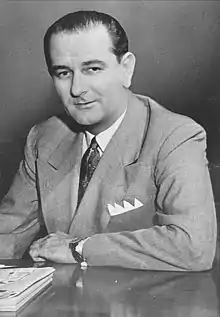
_Porter_US_Senate_candidate_from_Texas.jpg.webp)

